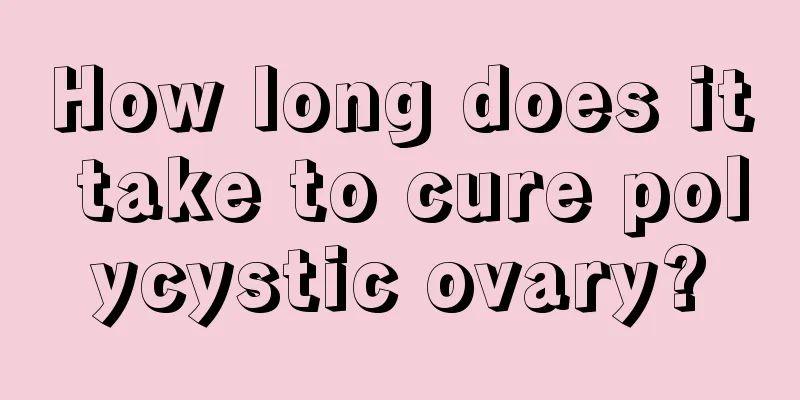How long does it take to cure polycystic ovary?

|
In fact, women with polycystic ovary syndrome can still be cured, because polycystic ovaries have a great impact on women's bodies and can cause infertility. Therefore, during treatment, we must find a way to remove the polycystic ovaries, and do more exercise, because exercise can help improve women's physical fitness and reduce women's weight, thereby increasing the possibility of conception. So how long will it take for polycystic ovaries to be cured? Can polycystic ovary disease be cured? The main purpose of PCOS treatment is to establish a normal menstrual cycle with ovulation, restore fertility, and eliminate hirsutism. Based on the symptoms of polycystic ovary disease, it can be inferred that if patients want to succeed, they should first ovulate normally and establish a normal menstrual cycle. At this time, if the ovaries no longer produce too much androgen, the hirsutism will disappear. Treatments for polycystic ovary disease include: 1. Obesity and insulin resistance Increase exercise to lose weight, correct endocrine and metabolic disorders aggravated by obesity, reduce insulin resistance and hyperinsulinemia, reduce IGF-1, increase IGfBP-1, and at the same time increase SHBG to reduce free androgen levels. Losing weight can restore ovulation in some obese women with PCOS and prevent the occurrence of type 2 diabetes and cardiovascular disease. Metformin treatment can be used for patients with or without diabetes. It can effectively reduce body weight, improve insulin sensitivity, lower insulin levels, reduce hair loss and even restore menstruation (25%) and ovulation. Since obesity and insulin resistance are the main causes of PCOS, any drug that can reduce weight and increase insulin sensitivity can treat this syndrome. 2. Drug-induced ovulation (1) Clomiphene is the drug of choice for PCOS, with an ovulation rate of 60% to 80% and a pregnancy rate of 30% to 50%. Clomiphene competes with endogenous estrogen receptors at the hypothalamus-pituitary level, inhibits estrogen negative feedback, increases the pulse frequency of GnRH secretion, and thus adjusts the secretion ratio of LH and FSH. Clomiphene also directly stimulates the ovaries to synthesize and secrete estrogen. After taking this drug, the ovaries may enlarge due to overstimulation (13.6%), vasodilation may cause hot flashes (10.4%), abdominal discomfort (5.5%), blurred vision (1.5%), or side effects such as rash and mild hair loss may occur. During treatment, it is necessary to record the basal body temperature of the menstrual cycle, monitor ovulation, or measure serum progesterone and estradiol to confirm whether ovulation occurs and guide the adjustment of the dosage for the next treatment course. If there is still no ovulation or conception after 6 to 12 months of clomiphene treatment, clomiphene plus HCG or glucocorticoids, bromocriptine or HMG, FSH, GnRH, etc. can be given. (2) Combination of clomiphene and human chorionic gonadotropin (HCG): HCG should be added on the 7th day after discontinuation of clomiphene. (3) The effect of glucocorticoids combined with clomiphene is based on its ability to inhibit excessive androgen secretion from the ovaries or adrenal glands. Dexamethasone or prednisone is usually used. The effective rate within 2 months is 35.7%, and the ovarian function of patients with amenorrhea and anovulation is restored to a certain extent. When clomiphene is ineffective in inducing ovulation, dexamethasone can be added during the treatment cycle. |
>>: Symptoms of Polycystic Ovarian Disease
Recommend
What does it mean when a woman has big nipples?
Women's breasts are often associated with sex...
What are the treatments for vitiligo in pregnant women?
Vitiligo is a very stubborn disease. The treatmen...
What are the benefits of a small cervix?
Because nowadays most women have irregular or abn...
What to eat to grow breasts
If your breasts are not full enough, it will be d...
What is the skin-like stuff in menstrual discharge?
Due to the special nature of menstruation, even t...
Do you have repeated dreams? Is there something wrong with your body? Doctors: There are three types of sleep conditions, which may be your body's cry for help
Have you ever experienced this during sleep? Xiao...
Experts recommend: Complete flu vaccination before the end of October! Because...
On September 6, 2024, at the press conference on ...
How to stop bleeding from uterine fibroids?
Uterine fibroids are a very common gynecological ...
Are you famous for wearing a "class style"? Here are two bad habits that make you ugly and in a bad mood. I guess you are doing them!
Recently many people have complained online: I am...
What are the harms of candidal vaginitis to the body
Due to the special physiological characteristics ...
What are the causes of candidal vaginitis?
Many women are troubled by abnormal leucorrhea, a...
How to remedy drinking coffee during menstruation
You cannot drink coffee during menstruation becau...
Women urinate more frequently at night
In daily life, the normal frequency of urination ...
eMarketer: The potential of advertising revenue in the mobile content industry
In today's mobile terminal landscape, markete...
A boy died of rabies despite being vaccinated. Is the “vaccine ineffectiveness theory” coming again?
Recently, a boy in Nanyang, Henan Province was bi...









